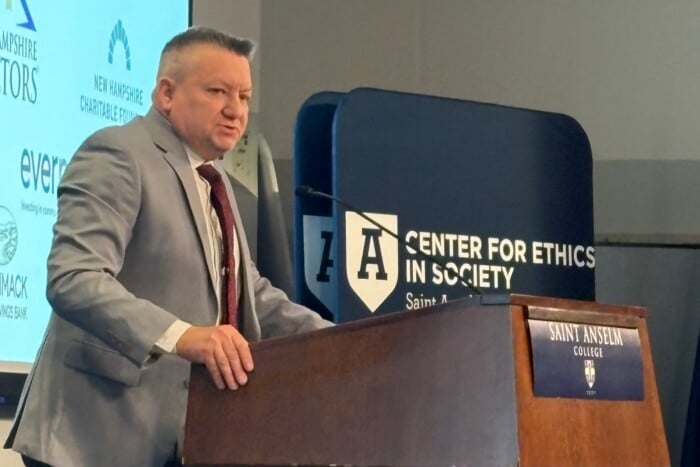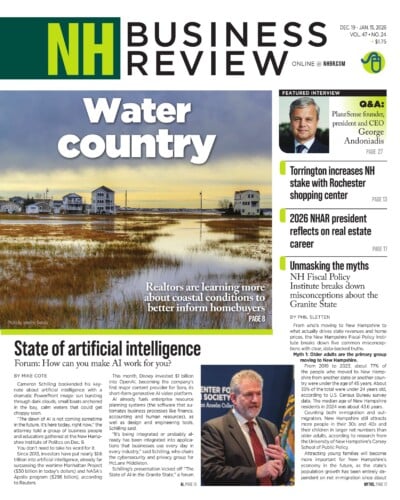
Taylor Caswell, commissioner of the New Hampshire Department of Business and Economic Affairs, speaks about housing during a press conference with then-Gov. Chris Sununu in 2022. (Ethan DeWitt-New Hampshire Bulletin)
As Taylor Caswell’s reappointment as commissioner of the NH Department of Business and Economic Affairs hangs in the balance, two independent statewide economic-related associations are standing with him and saying he should keep his job.
The presidents of the New Hampshire Business & Industry Association and Ski New Hampshire offered statements backing Caswell’s reappointment by the Executive Council.
Michael Skelton, president/CEO of the BIA, called Caswell’s continued leadership “critical.” Jessyca Keeler, SkiNH president, described Caswell as being “very responsive” to a variety of the state’s economic needs.
Both cited his work on tourism promotion, housing development and workforce development.
Three of the five-member Executive Council oppose Taylor’s reappointment: Republicans Joe Kenney, Dave Wheeler, and John Stephen. He has support from two: Democrat Karen Liot Hill and Republican Janet Stevens.
Republican Gov. Kelly Ayotte, while expressing confidence in Caswell, doesn’t have a vote on the council. But she has some political sway, which will be put to the test as she seeks at least one more vote on Caswell’s behalf.
Kenney, Stephen and Wheeler wrote Caswell a letter Aug. 14 asking him to answer an extensive list of questions about the purchase of the property by a subsidiary of Nongfu Spring and what role his department had in it.
Ayotte has directed Attorney General John Formella to review the events leading up to the purchase of the Nashua building for $67 million, more than four times its assessed value of $15.6 million.
“The Governor has directed the Attorney General to examine the facts and circumstances of Nongfu Spring’s purchase of property in Nashua, including state and local involvement in that process,” the governor’s spokesman, John Corbett, said in a statement to NH Business Review.
“The Communist Party of China has no home in New Hampshire, and we should scrutinize all purchases made by adversaries of our country,” the statement said.
Such strong language from the governor’s office even puts into question support that Ayotte had expressed for Caswell’s reappointment.
In media reports, Stevens, whose district includes the Seacoast, cites support expressed by chambers of commerce in the region. Liot Hill, from Lebanon, cites Caswell’s help in housing and economic development.
But Wheeler hasn’t liked some of the expense requests that Caswell put before the council, saying the commissioner hasn’t been careful with taxpayer money. Kenney sees in Caswell a lack of attention to certain parts of the state and their economies — particularly the North Country and wood products.
The three councilors co-wrote a piece for NH Journal dated Aug. 1 addressing their reasons for not supporting Caswell’s reappointment. Their issues included misaligned budget priorities, neglect of rural development, fiscal mismanagement, and agency culture and leadership gaps.
“We respectfully urge the governor to nominate a new leader who can deliver on these priorities and ensure that the BEA serves all Granite Staters effectively,” they said.
By law, the governor can keep Caswell in his position in a so-called “holdover” status for up to six months. Caswell was appointed to the position in 2017, nominated by then Gov. Chris Sununu to head the newly named and organized BEA.
Caswell, asked by NH Business Review about his reappointment, said he had no comment at this time.
Skelton at the BIA said Caswell transformed the BEA “into a go-to resource and partner for our state’s business community.
“Not a week goes by where our teams are not in touch and working collaboratively on key issues like housing, child care, workforce development and business recruitment,” Skelton said in a statement to NH Business Review.
Skelton, on behalf of the BIA, submitted a letter to the Executive Council two days before the July 30 meeting.
“During Commissioner Caswell’s tenure, BEA has accomplished an impressive record of success and impact on key issues of importance to the business community. Whether it was the BEA’s work to deploy investments to address NH’s housing crisis, coordinating broadband expansion efforts, enhancing tourism marketing and promotion efforts to record setting results, or facilitating and supporting hundreds of millions in business investments in our state, BEA’s track record under Commissioner Caswell is that of exceptional results for NH’s economy and business community,” the letter said in part.
Skelton reminded councilors that the BIA “serves as our statewide chamber of commerce, state manufacturing association, and leading nonpartisan business advocate. Our association represents more than 450 employers and organizations from across New Hampshire that contribute more than $5 billion to our state’s economy.”
Skelton lauded Caswell’s attitude and approach.
“I have heard countless examples of business, nonprofit and municipal leaders who have reached out to Commissioner Caswell for help, guidance or an opportunity to partner or collaborate,” Skelton wrote. “The responses are always prompt, professional, and move at the speed of business with an eye towards achieving results and impact.”
Keeler described Caswell as not only a “staunch supporter” of the state’s ski industry, “but the state’s travel and tourism industry and outdoor recreation at large since his appointment by Governor Sununu in 2017.”
“Commissioner Caswell has been very responsive to our industry’s needs, and has welcomed our voice at the table around topics of tourism promotion, housing development, workforce development, and showcasing outdoor recreation opportunities as a means of attracting businesses to the state,” said Keeler.
Keeler recalled the COVID pandemic as particularly trying for New Hampshire businesses.
“During the pandemic, he worked with us to develop guidance to open ski areas for the 2020-21 winter, which allowed us to complete the season with no COVID-19 outbreaks attributed to ski areas and with skier visitation that outperformed other states in the Northeast,” she said.
Taylor’s efforts to help promote the state as an attractive place to visit has a spillover effect that Keeler said is important to the state’s economic future.
“The Commissioner also recognizes that some of what makes New Hampshire so appealing for visitors can also help lure businesses to the state and keep them here, particularly as younger generations in the workforce place a high value on work-life balance,” she said.
“The recent ‘Workforce Toolkit for the Outdoor Lifestyle’ put together by the Office of Outdoor Recreation Industry Development is great example of how the BEA, under his leadership, has showcased the state’s vast and varied outdoor recreation resources to help existing and potential NH businesses rethink how they attract and retain workers,” she added.













